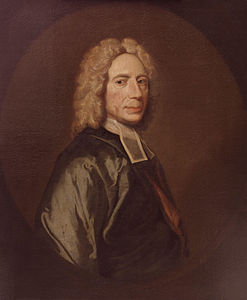Psalm 77 part 1
Isaac Watts 1674 (Southampton, Hampshire) – 1748 (Stoke Newington, Middlesex)
Melancholy assaulting, and hope prevailing.
To God I cried with mournful voice,
I sought his gracious ear,
In the sad day when troubles rose,
And filled the night with fear.
Sad were my days, and dark my nights,
My soul refused relief;
I thought on God the just and wise,
But thoughts increased my grief.
Still I complained, and still oppressed,
My heart began to break;
My God, thy wrath forbade my rest,
And kept my eyes awake.
My overwhelming sorrows grew,
Till I could speak no more;
Then I within myself withdrew,
And called thy judgments o'er.
I called back years and ancient times
When I beheld thy face;
My spirit searched for secret crimes
That might withhold thy grace.
I called thy mercies to my mind
Which I enjoyed before;
And will the Lord no more be kind?
His face appear no more?
Will he for ever cast me off?
His promise ever fail?
Has he forgot his tender love?
Shall anger still prevail?
But I forbid this hopeless thought;
This dark, despairing frame,
Rememb'ring what thy hand hath wrought;
Thy hand is still the same.
I'll think again of all thy ways,
And talk thy wonders o'er;
Thy wonders of recovering grace,
When flesh could hope no more.
Grace dwells with justice on the throne;
And men that love thy word
Have in thy sanctuary known
The counsels of the Lord.
Font size:
Submitted on May 13, 2011
Modified on March 05, 2023
- 1:12 min read
- 33 Views
Quick analysis:
| Scheme | X XXXX XAXA BCBC DEDF GHGH IEIE XJXJ KLKL XFHE MXMX |
|---|---|
| Closest metre | Iambic tetrameter |
| Characters | 1,254 |
| Words | 236 |
| Stanzas | 11 |
| Stanza Lengths | 1, 4, 4, 4, 4, 4, 4, 4, 4, 4, 4 |
Translation
Find a translation for this poem in other languages:
Select another language:
- - Select -
- 简体中文 (Chinese - Simplified)
- 繁體中文 (Chinese - Traditional)
- Español (Spanish)
- Esperanto (Esperanto)
- 日本語 (Japanese)
- Português (Portuguese)
- Deutsch (German)
- العربية (Arabic)
- Français (French)
- Русский (Russian)
- ಕನ್ನಡ (Kannada)
- 한국어 (Korean)
- עברית (Hebrew)
- Gaeilge (Irish)
- Українська (Ukrainian)
- اردو (Urdu)
- Magyar (Hungarian)
- मानक हिन्दी (Hindi)
- Indonesia (Indonesian)
- Italiano (Italian)
- தமிழ் (Tamil)
- Türkçe (Turkish)
- తెలుగు (Telugu)
- ภาษาไทย (Thai)
- Tiếng Việt (Vietnamese)
- Čeština (Czech)
- Polski (Polish)
- Bahasa Indonesia (Indonesian)
- Românește (Romanian)
- Nederlands (Dutch)
- Ελληνικά (Greek)
- Latinum (Latin)
- Svenska (Swedish)
- Dansk (Danish)
- Suomi (Finnish)
- فارسی (Persian)
- ייִדיש (Yiddish)
- հայերեն (Armenian)
- Norsk (Norwegian)
- English (English)
Citation
Use the citation below to add this poem to your bibliography:
Style:MLAChicagoAPA
"Psalm 77 part 1" Poetry.com. STANDS4 LLC, 2024. Web. 19 Apr. 2024. <https://www.poetry.com/poem/19816/psalm-77-part-1>.



Discuss the poem Psalm 77 part 1 with the community...
Report Comment
We're doing our best to make sure our content is useful, accurate and safe.
If by any chance you spot an inappropriate comment while navigating through our website please use this form to let us know, and we'll take care of it shortly.
Attachment
You need to be logged in to favorite.
Log In